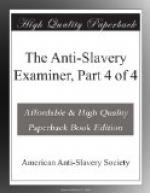Professor Stewart admits, that the Golden Rule and the second great commandment “decide against the theory of slavery, as being in itself right.” What, then, is their relation to the particular precepts, institutions, and usages, which are authorized and enjoined in the New Testament? Of all these, they are the summary expression—the comprehensive description. No precept in the Bible, enforcing our mutual obligations, can be more or less than the application of these injunctions to specific relations or particular occasions and conditions. Neither in the Old Testament nor the New, do prophets teach or laws enjoin, any thing which the Golden Rule and the second great command do not contain. Whatever they forbid, no other precept can require; and whatever they require, no other precept can forbid. What, then, does he attempt, who turns over the sacred pages to find something in the way of permission or command, which may set him free from the obligations of the Golden Rule? What must his objects, methods, spirit be, to force him to enter upon such inquiries?—to compel him to search the Bible for such a purpose? Can he have good intentions, or be well employed? Is his frame of mind adapted to the study of the Bible?—to make its meaning plain and welcome? What must he think of God, to search his word in quest of gross inconsistencies, and grave contradictions! Inconsistent legislation in Jehovah! Contradictory commands! Permissions at war with prohibitions! General requirements at variance with particular arrangements!
What must be the moral character of any institution which the Golden Rule decides against?—which the second great command condemns? It cannot but be wicked, whether newly established or long maintained. However it may be shaped, turned, colored—under every modification and at all times—wickedness must be its proper character. It must be, IN ITSELF, apart from its circumstances, IN ITS ESSENCE, apart from its incidents, SINFUL.
“THINK NOT TO SAY
WITHIN YOURSELVES,
WE HAVE ABRAHAM FOR OUR FATHER.”
In disposing of those precepts and exhortations which have a specific bearing upon the subject of slavery, it is greatly important, nay, absolutely essential, that we look forth upon the objects around us from the right post of observation. Our stand we must take at some central point, amidst the general maxims and fundamental precepts, the known circumstances and characteristic arrangements, of primitive Christianity. Otherwise, wrong views and false conclusions will be the result of our studies. We cannot, therefore, be too earnest in trying to catch the general features and prevalent spirit of the New Testament institutions and arrangements. For to what conclusions must we come, if we unwittingly pursue our inquiries under the bias of the prejudice, that the general maxims of social life which now prevail in this country, were current, on the authority of the Savior, among the




